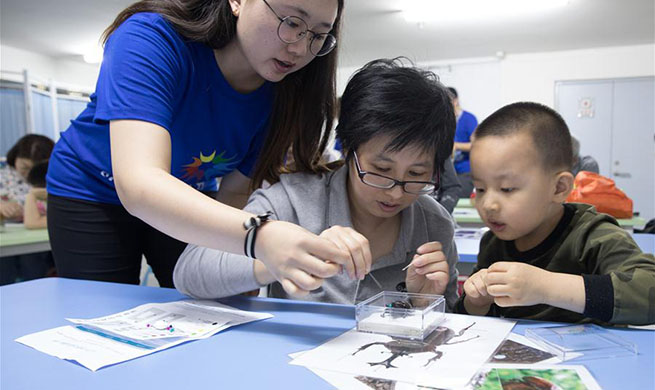by Xinhua writer Gao Shan
SALT LAKE CITY, the United States, May 20 (Xinhua) -- Standing with a bright smile in front of a booth at the 11th annual U.S. National Chinese Language Conference at a hotel in Salt Lake City, educational coordinator Brain White warmly greeted attendees.
His visitors were among the 1,300 teachers, administrators and officials from across the United States who attended the conference at the Grand American Hotel.
White represents Educational Partners International (EPI), a company that sponsors exchange programs and facilitates international teacher recruitment, placement, and support. It aims to build up contacts with Chinese language teachers attending the conference, which ended on Saturday.
"There is an increasing demand from U.S. schools to have Chinese language programs, but there's difficulty obtaining teachers that are qualified to teach," said White.
"We work with teachers from all over the world, but we are here today to put an emphasis on the importance for Chinese teachers to come over to the U.S. and learn about our education system," he said, adding that in the meantime his organization aims to "give American students the opportunity to learn more about Chinese language, Chinese culture and inspire them to travel to China."
EPI, he said, is the bridge between American schools and Chinese language teachers, and that they are committed to recruiting the best teachers for American schools.
Chinese language courses are now available in more and more primary and secondary schools across the United States, ranking the fourth most widely taught foreign language in the country's education system, according to the National K-12 Foreign Language Enrollment Survey Report released last year.
The survey shows that as many as 227,086 American students have enrolled in Mandarin courses, trailing those taking Spanish, French and German. Mandarin is China's official language and currently has the largest number of native speakers in the world.
With the rise of Chinese language programs in recent years, a shortage of qualified Mandarin teachers has become a challenge for U.S. school administrators and policymakers who hope to expand their language curricula.
EPI's vigorous efforts to recruit Mandarin teachers is a new initiative the increasing demand for Chinese language teachers in the United States, according to White.
According to White, EPI is a new initiative launched to cope with the aforementioned challenge. Whereas, it was not the only organization in the conference looking to recruit more Mandarin teachers.
Eddie Conger, founder and superintendent of International Leadership of Texas (IL Texas) took part in the event and talked with participants face-to-face.
IL Texas is a public charter school founded in 2013 in the southwestern state of Texas. The number of the students attending IL Texas has increased from 5,000 to a staggering 16,000 in the last five years.
According to Conger, IL Texas is the largest school system in the United States that requires all students, aged 5 to 18, to master not only English, but Spanish and Mandarin as well. The requirement demonstrates an effort to better equip the graduates to adapt to the highly competitive international business landscape of the future.
"Because of our incredible growth in five years, the demand for international teachers is very important," said Conger, adding that they are working with Hanban, the Chinese institution tasked with promoting Chinese language worldwide, to look for opportunities to bring more Chinese teachers to Texas.
There are 93 Mandarin teachers in IL Texas currently, but the school hopes to hire around 20 more in the coming year, according to Xiaoyan Wang, director of the Chinese Language program at IL Texas.
"It doesn't mean you are a qualified Chinese language teacher even you can speak fluent Mandarin. You should be creative in teaching skills and proficient in some other subjects, such as science and math," Wang said.
Echoing Wang's remarks, White said eligible teachers for EPI must currently be teaching full-time and "have two years full-time teaching experience."
In the end, language could be the key in bridging the several gaps that exist among the world's two largest economies.
"It would be a much better world for Chinese and American students to be able to understand each other's language," said Conger, "and understand and respect each other's culture."
















